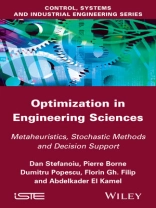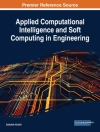The purpose of this book is to present the main metaheuristics
and approximate and stochastic methods for optimization of complex
systems in Engineering Sciences. It has been written within the
framework of the European Union project ERRIC (Empowering Romanian
Research on Intelligent Information Technologies), which is funded
by the EU’s FP7 Research Potential program and has been
developed in co-operation between French and Romanian teaching
researchers. Through the principles of various proposed algorithms
(with additional references) this book allows the reader to explore
various methods of implementation such as metaheuristics, local
search and populationbased methods. It examines multi-objective and
stochastic optimization, as well as methods and tools for
computer-aided decision-making and simulation for
decision-making.
表中的内容
1. METAHEURISTICS, LOCAL SEARCH
1.1. Hill Climbing
1.2. Tabu Search
1.3. Simulated Annealing
1.4. Tunneling
1.5. Algorithms with Penalties
1.6 GRASP METHOD
2. METAHEURISTICS, POPULATION- BASED METHODS
2.1. Evolutionary Algorithms
2.2. Genetics Algorithms
2.2.1. Biologic Breviary
2.2.2. Genetic Algorithms Principle
2.2.3. Scheme Theorem of J. Holland
2.2.4. Vose-Liepins Algorithm with Infinite Population
2.2.5. Nix-Vose Algorithm with finite Population
2.2.6. How to implement a Genetic Algorithms
2.3. Ant Colony Optimization Algorithms
2.4. Particle Swarm Optimization
2.4.1 General Algorithm
2.4.2. Firefly Algorithm
2.4.3 Bat Algorithm
2.4.4 Bees Algorithm
2.4.5 Improved Particle Swarm Optimization Algorithm
3. MULTI-OBJECTIVE OPTIMIZATION
3.1 Pareto-optimality
3.2 Choquet Integral
3.3 Optimization with two Objective Functions
3.3.1 Identification and Optimization, Two Control Objectives
3.3.2 Aggregation of Identification and Optimization Stages
3.3.3 Problem Construction and Solution : parametric representation, variables recursive partitioning, approach on the objective functions sensitivity
4. STOCHASTIC OPTIMIZATION
4.1Problem Position
4.2 Repartition Function Calculation
4.3 Optimality Stochastic Criteria
4.3.1 Calculation of the Solution to the Stochastic Problem – Admissible Solutions Case, Minimum Risk Problem, Imposed Risk Problem
4.3.2 Calculation of Solution to the Stochastic Problem- Partially Admissible Solutions
4.3.3Case Studies
5. METHODS AND TOOLS FOR COMPUTER AIDED DECISION6MAKING
5.1. Optimal vs suboptimal solutions
5.2 Methods
5.2.1 Influence diagrams and decision trees
5.2.2 Game theory based methods
5.2.3 Multiattribute decision models
5.2.4 Other methods (Borda , Condorcet , Onicescu)
5.2.5 Combinations of numerical models and AI–based techniques
5.3. Decision Support Systems
5.4. Criteria or decision-makers ?
6. DECISION MAKING USING SIMULATION
6.1 Problem statement in environment with uncertainties
6.2. Limits of formal approaches
6.3 Benefits of simulation for decision making
6.4 Development approach
6.5 Study cases:
6.5.1 New product release
6.5.2 Stock management
6.5.3 Plane overbooking
6.5.4 Car rental
6.5.5 ATM
6.5.6 Bank placements
7. APPLICATIONS
7.1. Fuzzy reasoning and genetic optimization in manufacturing
7.2. Genetic matching pursuit for mechanical faults
7.3. Phenomena prediction by using particle swarm optimization
7.4 Optimization of a petrochemical platform
7.4.1 Technological insights and existing automation
7.4.2 Optimizing the ethylene reactor
7.5 Optimization of a thermo-energetic installation
7.5.1 Technological insights and existing automation
7.5.2 Optimizing the heating system
7.6 Optimization of combustion process in a steel making plant
7.6.1 Technological insights and existing automation
7.6.2 Optimizing the combustion process
8. CONCLUSION
关于作者
Dan Stefanoiu is Professor in the fields of Signal Processing and System Identification at Politehnica University of Bucharest. In 2002 he was elected as a member of the American Romanian Academy of Arts and Sciences (ARA).
Pierre Borne is Professor at École Centrale de Lille, France. He has received honorary degrees from the University of Moscow, Russia, the Politehnica University of Bucharest, Romania, and the University of Waterloo, Canada. He is a Fellow of the IEEE.
Dumitru Popescu is Professor at Politehnica University of Bucharest, Romania, in the fields of Advanced Control and Systems Optimization and also Associate Professor at major universities in France and Italy. He is Director of the Research Center in Automatics, Process Control and Computers (APCC) affiliated to Politehnica University of Bucharest, a member of the IFAC Technical Committees for the Control of Bioprocesses and Chemical Processes and a corresponding member of the Romanian Academy of Technical Sciences.
Florin Gh. Filip is a researcher and Professor in the fields of Optimization and Control of Large-scale Systems, applied IT including decision support systems. He was elected as a member of the Romanian Academy (National Academy of Sciences of Romania) in 1991 and President of the ‘Information Science and Technology’ section of the Academy in 2011. He was the Vice President of the Romanian Academy from 2001 to 2010 and the chair of the IFAC TC 5.4 ‘Large-scale complex systems’ from 2002 to 2008.
Abdelkader El Kamel is Professor in the fields of Advanced Control, System Optimization and Decision-Making at École Centrale de Lille in France. He is also a regular Visiting Professor, mainly in China, Chile and at major engineering and business schools in Tunisia.












